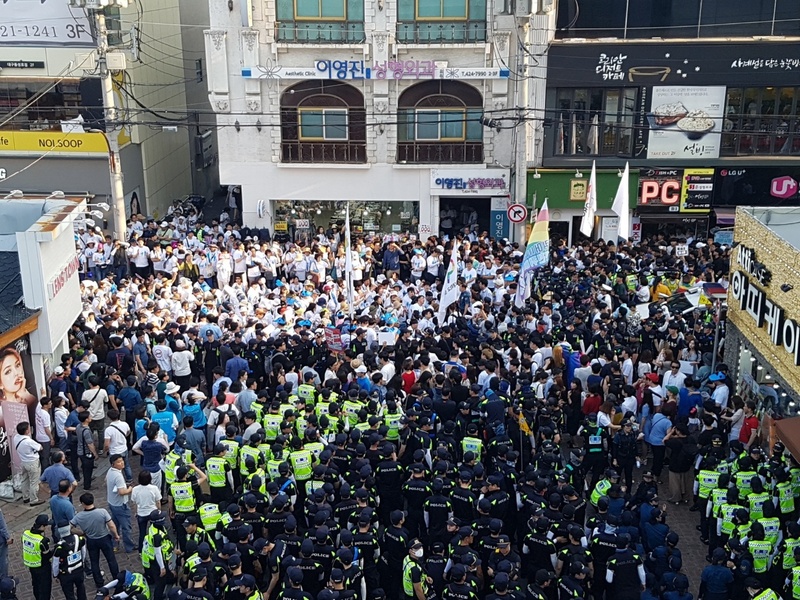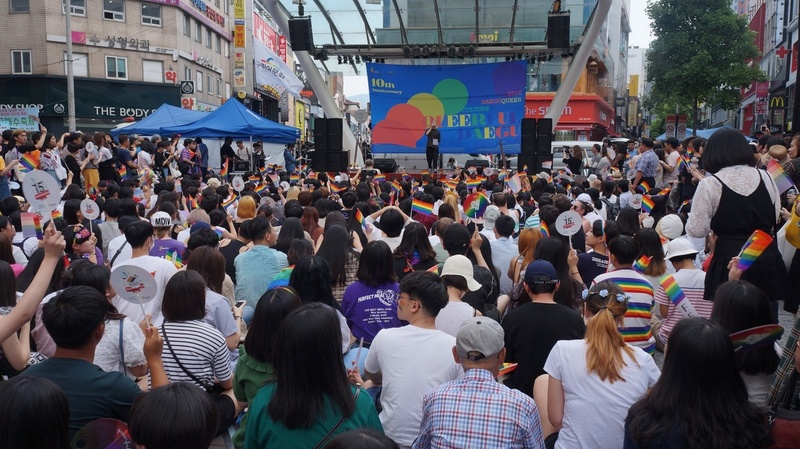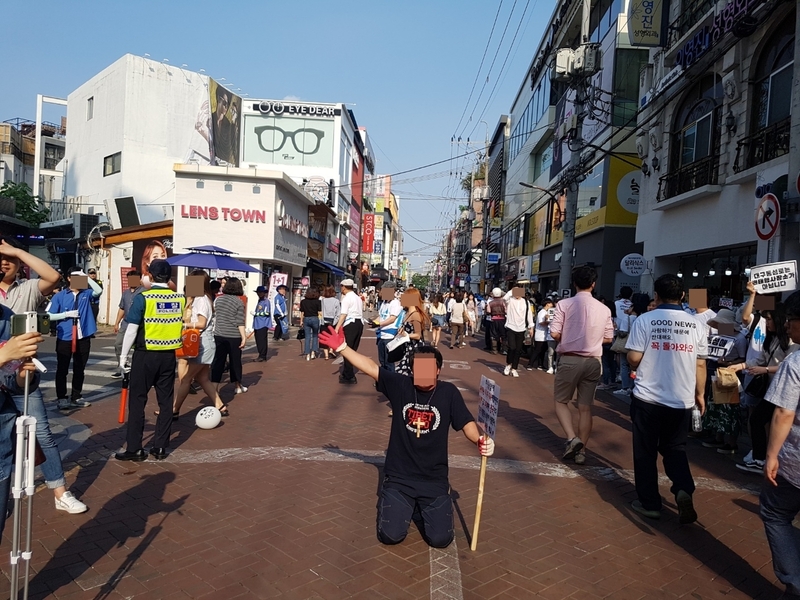Posted on : Jun.25,2018 17:18 KST
Modified on : Jun.25,2018 17:22 KST
 |
|
Christians in opposition to homosexuality gather on Dongseong No. 6 Road in Daegu to block the parade of the city’s Queer Culture Festival on June 23. (all photos by Kim Il-woo, Daegu correspondent)
|
Christian conservatives organize in opposition to Queer Culture Festival
It was a confrontation between love and hate. At 2 pm on June 23, dozens of buses were parked along Daegu’s Dongseong Road, site of the tenth annual Queer Culture Festival. Emblazoned with the name “Real Love,” the buses had brought opponents of the festival to Daegu from Seoul, Gyeonggi Province, and nine other places around South Korea. While there have been several clashes in the past between the festivals’ participants and opponents, this was the first time a nationwide bus campaign had been organized. I boarded one of the Real Love buses to hear the thoughts of people objecting to the festival.
“Have a seat here, Deacon.”
Without any questions asked, people cheerfully offered to give me their seats when I boarded one of the Real Love buses embarking at 1 pm that day from in front of a church in Changwon, South Gyeongsang Province. The bus was bound for Daegu, carrying Christian passengers from the South Gyeongsang area – including Masan, Changwon, and Jinhae. Inside, passengers were heatedly discussing their planned methods for a scheduled July 10 demonstration in front the Masan Office of Education to protest a human rights ordinance. They were planning a signature campaign, the production of banners, and demonstrations to prevent the enactment of a “youth human rights ordinance” as pledged by South Gyeongsang Education Superintendent Park Jong-hoon, who won a second term in the recent local elections.
 |
|
Participants in Daegu’s tenth annual Queer Cultural observe a stage performance on June 23.
|
There was no argument among the passengers that the human rights ordinance should be “immediately abolished” for “allowing young people to engage in indiscriminate sexual intercourse and teaching homosexuality.” They also lamented the serious loss of influence by the conservative parties that would otherwise be leading the way to abolish the ordinance in the wake of the June 13 election.
“We need to draw strength from the right-wingers,” repeated one of the passengers, who claimed to be involved mostly in external negotiations.
During a Queer Culture Festival in Daegu in 2014, church group members dumped garbage on the festival. I wondered if anything had changed now that they were riding “love buses.” But as Daegu came into view, one of the pastors said, “Let us pray now. Let us arm ourselves spiritually so that we do not succumb to the wicked ones.”
“Let us crush them first with our eyes before we are stung by the filthy ones.”
 |
|
A Christian opposed to homosexuality kneels on Dongseong No. 6 road in Daegu to protest the queer festival on June 23.
|
Other passengers went along. From that point until our arrival at the venue, the bus was filled with the sound of praying.
At 2:30, the bus arrived at the entrance of February 28 Democratic Movement Memorial Park in Daegu’s Gongpyeong neighborhood, and the passengers began passing out T-shirts. The front of the white shirts showed a mother and father holding their children’s hands; a message on the back read, “We oppose because we love. Come back.” The bus I was riding joined dozens of cars at the park. The people exiting them were mostly older “Deacons” and “Elders” with five to six younger people in tow. Appearing to be their teens and twenties, the younger people stood in line by the side of the road to the venue carrying signs reading, “The dictionary definition of ‘queer’ = pervert,” “Quit smoking and being gay,” and “4,000 Koreans have died of AIDS because homosexuality is presented as ‘human rights.’” The older ones took up “close quarters” positions right in front of the plaza where Dongseong Road’s outdoor stage was located.
A group calling itself the Anti-Queer Countermeasure Headquarters filed a notice police for a “true education campaign prayer meeting” 200 meters from the festival venue. As the festivities began, the boundary between the two groups dissolved. From inside the festival site, the sounds of the Oasis song “Don’t Look Back in Anger” rang out – but angry curses were being exchanged between the festival’s organizers and the people attempting to block it.
At around 5:30 pm, a group of roughly 1,000 Christians sat down in the middle of Dongseong No. 6 Road, which led from the outdoor stage plaza to Samdeok Catholic Church. They were attempting to stop the Queer Parade scheduled as the festival’s climax. Police demanded that they disperse, but they refused to clear the road, singing the national anthem as they held out. After an hour of waiting, the Queer Culture Festival marchers finally assembled at Gongpyeong Intersection and marched in a different direction.
As the confrontation dragged on, most of the younger people left, leaving only the older Anti-Queer Countermeasure Headquarters members blocking the road. I asked one woman in her sixties why she was opposed to homosexuality. “When two men have intercourse with each other, it causes AIDS,” she replied. I then asked her if she wasn’t opposed to women having intercourse with each other.
“Oh, I don’t really know about that,” she replied.
 |
|
Anti-queer demonstrators gather around the Queer Culture Festival in Daegu on June 23, holding placards and wearing t-shirts that express their opposition to homosexuality.
|
Relative indifference among young Christian conservatives
Last year, students from 43 universities nationwide banded together into a University Student Alliance to Oppose a Constitutional Amendment for Same-Sex Marriage. But most of the younger people I met that day were not very strong in their opposition to homosexuality.
“I just came here out of obedience because the Reverend kept talking about it during sermons,” said a 21-year-old Daegu resident surnamed Kim. A 29-year-old surnamed Cho who claimed to live near Dongseong Road said, “I wore the white T-shirt, but I don’t especially agree with the opposition. I came because I was curious what kind of culture it was.”
“Where did you go? Come over here.”
One of the passengers I had met on the bus beckoned delightedly after seeing me standing with the Queer Culture Festival group. But the barrier raised by people who believe love is “only for heterosexuals” was too thick for me to cross over from the side with the rainbow flags to the one with the white flags.
By Kim Il-woo, Daegu correspondent, and Nam Eun-joo, staff reporter
Please direct comments or questions to [english@hani.co.kr]












